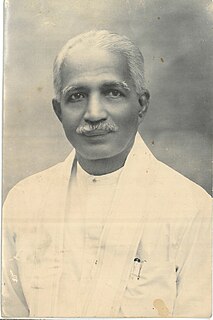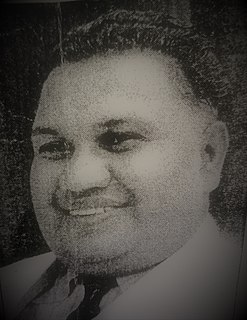Related Research Articles

Dr. Cristopher William Wijekoon Kannangara was a Sri Lankan Lawyer and a politician, accredited often with being the Founder of the post independence island nation. Rising up the ranks of Sri Lanka's movement for independence in the early part of the 20th century, he moved on to play a pivotal role defending leaders of the independence movement in court and achieving vital legal victories contributing vastly to the cause of independence as a lawyer and orator, soon achieving the Presidency of Ceylon National Congress, the forerunner to Sri Lanka's Parliament UNP. Later, he became the first Minister of Education in the State Council of Ceylon, and was instrumental in introducing extensive reforms to the country's education system that opened up education to children from all levels of society.

Sir Don Baron Jayatilaka, KBE known as D.B. Jayatilaka was a Sri Lankan educationalist, statesmen and diplomat. He was Vice-President of the Legislative Council of Ceylon; the Minister for Home Affairs and Leader of the House of the State Council of Ceylon; and Representative of Government of Ceylon in New Delhi. Sir D. B. Jayatilaka is also considered as a flag bearer of Buddhist education in Sri Lanka.
Pahalage Rohitha Piyatissa Abeygunawardena is a Sri Lankan politician and businessman. He was the Minister of Nation Building. He is a representative of Kalutara District for the United People's Freedom Alliance in the Parliament of Sri Lanka. He is often referred to by the masses as "Raththaran". On 27 November 2019, he was appointed as Minister for Energy On 12 August 2020, he was appointed as the minister of ports and shipping.
Unnanthi Piyankara Jayaratne, MP is a Sri Lankan politician and a member of the Parliament of Sri Lanka.
Justice Ameer Ismail is a retired Judge of the Supreme Court of Sri Lanka and a former Chairman of the Commission to Investigate Allegations of Bribery or Corruption, Sri Lanka.

Rudra Srichandra Rajasingham was a Sri Lankan police officer and diplomat. He was the Inspector General of Police and Sri Lankan Ambassador to Indonesia.

Prince Gunarasa Casinader was a Sri Lankan Tamil teacher, politician and Member of Parliament.
Manameldura Piyadasa de Zoysa was a Ceylonese politician.

Casila Abdul Samed "Sinhala" Marikkar was a Sri Lankan politician. He served as Minister for Post, Broadcasting and Communication from 1956 until 1960 in the S. W. R. D. Bandaranaike cabinet and Dahanayake cabinet, and was a member of parliament representing the Sri Lanka Freedom Party (SLFP) from Kadugannawa.
The following lists notable events that occurred during 2016 in Sri Lanka.
Emmanuel Rasanayagam Tambimuttu was a Ceylon Tamil lawyer, politician and member of the Legislative Council of Ceylon and State Council of Ceylon.

The 2nd State Council of Ceylon was a meeting of the State Council of Ceylon, with the membership determined by the results of the 1936 state council election held between 22 February and 7 March 1936. The parliament met for the first time on 17 March 1936 and was dissolved on 4 July 1947.
Edwin Wilfred Abeygunasekera was a member of the 1st and 2nd State Councils of Ceylon.
John Gladstone Rajakulendran was a Ceylonese Tamil teacher and politician.
Henry Abeywickrema Goonesekera was a Ceylonese politician, who was a member of the 2nd State Council of Ceylon.
Gate Mudaliyar Alexander Edmund de Silva Wijegooneratne Samaraweera Rajapakse OBE was a Ceylonese colonial-era politician and headman.
Daniel Dias Gunasekera was a Ceylonese businessman and politician.
Indra de Silva was the 28th Inspector General of the Sri Lanka Police (IGP) (2003–2004).
Lucien Macull Dominic de Silva, QC, PC was a Ceylonese lawyer and judge, who was a Solicitor General of Ceylon, sat on the Supreme Court of Ceylon and the Judicial Committee of the Privy Council.
The Parliamentary Bribery Commission was a commission of inquiry appointed by Governor General of Ceylon Sir Oliver Goonetilleke by warrant dated 11 September 1959 under the request of the Prime Minister of Ceylon S. W. R. D. Bandaranaike under the advice of G. G. Ponnambalam, to investigate and inquire into allegations of bribery and corruption among the ruling party members of parliament. The Commission consisted of Walter Thalgodapitiya, District Judge as chairmen; Thomas Webb Roberts, retired officer of the Ceylon Civil Service and Samuel John Charles Schokman, Advocate and former Crown Counsel. Appointed days before the Bandaranaike assassination, the commission tabled its report, titled The Reports of the Parliamentary Bribery Commission, 1959-1960 in the House of Representatives of Ceylon on 16 December 1960 and was published on 22 December 1960. The report found evidence of bribery against two former ministers C. A. S. Marikkar and M. P. de Zoysa, as well as parliamentarians D. B. Monnekulame, H. Abeywickrema, M. S. Kariapper and R. E. Jayatillake. Monnekulame and Kariapper resigned soon after the publication of the report. The Sirima Bandaranaike government at the time did not take any action based on the report. In 1965, the new national government, revisited the report and enacted the Imposition Of Civic Disabilities Act which stripped Marikkar, de Zoysa, Abeywickrema, Kariapper, Jayatilleke, and Monnekulame of their civic rights for a period of seven years and Kariapper who was a member of parliament at the time lost his seat.
References
- ↑ "Bribery and corruption in pre-independence legislature". Daily Mirror. Retrieved 26 August 2021.
- ↑ Goonetilleke, T. V. (1984). Facets of Our Legislature. Library of Parliament. pp. 39–40.
- ↑ "Of 69 Years- 57 Gobbled up by Politicians, their Acolytes, Cronies and Vandibattas!". Daily Mirror. Retrieved 27 August 2021.